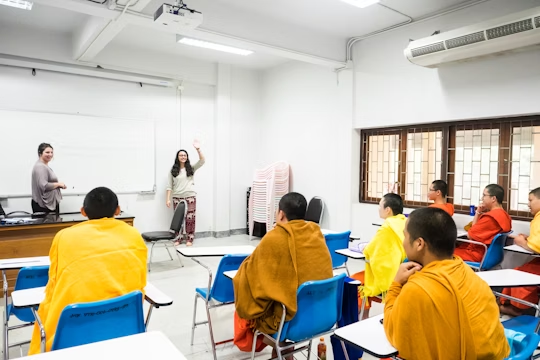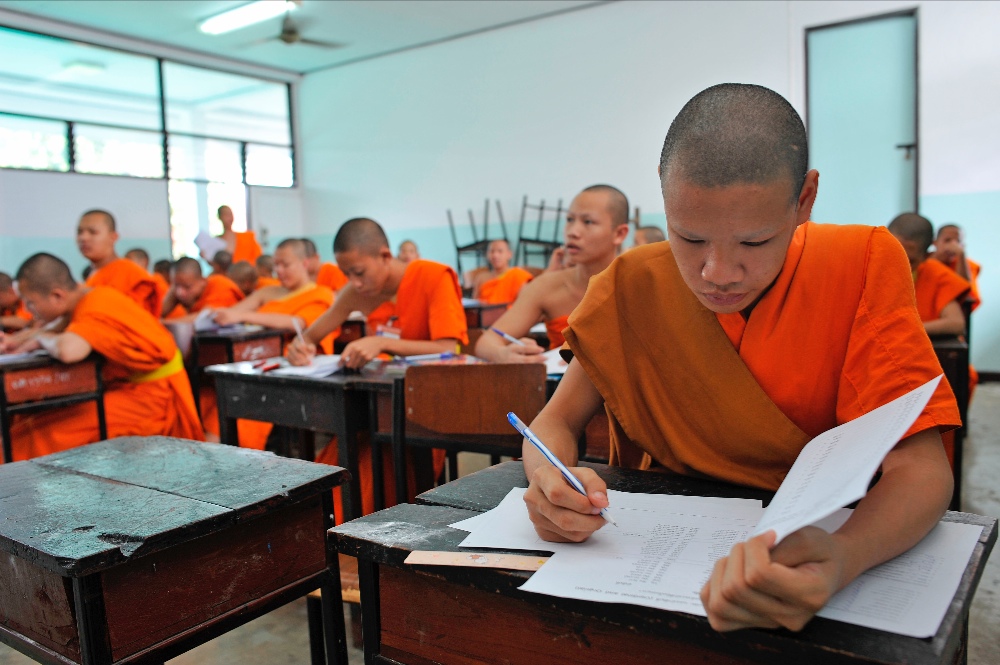With its beautiful beaches, bustling cities, rich culture, and warm-hearted people, teaching English in Thailand offers an exciting opportunity for those looking to live and work abroad. Thailand, known as the “Land of Smiles,” offers a wealth of opportunities for aspiring English teachers.
If you’re considering leaping, here’s a friendly guide packed with everything you need to know before you embark on this exciting journey.
Why Choose Thailand?
Thailand is one of the most popular destinations for English teachers, and for good reason.

The demand for English teachers is high, and the country’s welcoming nature makes it an ideal place for foreigners to settle in and experience a new culture.
- Cultural Immersion: Teaching in Thailand means diving into a fascinating culture where ancient traditions coexist with modern urban life. You’ll have the chance to learn Thai, explore local cuisine, and enjoy countless festivals and celebrations.
- Affordable Living: The cost of living in Thailand is relatively low, making it easier to save money while living abroad. You can enjoy a comfortable lifestyle on a teacher’s salary, whether you’re living in bustling Bangkok or a smaller town.
- Travel Opportunities: Thailand’s location in Southeast Asia makes it a great base for traveling. Whether you’re exploring nearby countries like Cambodia, Vietnam, or Laos, or discovering hidden gems within Thailand itself, there’s always something to explore.
From the majestic temples and vibrant street food culture to the idyllic islands and jungles, Thailand offers a unique and rich experience that blends work and adventure.
Getting Qualified
Before packing your bags, it’s important to understand the qualifications required to teach English in Thailand.

While the process is straightforward, there are some basic requirements:
- Degree: You’ll need a bachelor’s degree in any field. While a degree in education or English is preferable, it’s not a strict requirement for many positions.
- Expert-level English: Many schools prefer English speakers from countries like the USA, Canada, the UK, Australia, and New Zealand. However, speakers with a high level of English proficiency from any country can also find teaching jobs.
- Background Check: Some schools will require a clean criminal background check, particularly for teaching minors.
- TEFL Certification: Most schools require teachers to have a TEFL (Teaching English as a Foreign Language) certification. While you can sometimes find work without one, having a TEFL qualification can greatly increase your chances of securing a job and earning a better salary.
- The International TEFL Academy (ITA) offers globally recognized TEFL certification courses, including immersive programs in Chiang Mai and Hua Hin. With expert training, cultural exchanges, and lifetime job placement assistance, ITA prepares graduates to teach English worldwide. Explore guaranteed teaching placements, competitive salaries, and a vibrant Thai adventure!
Navigating the Visa Process
Working legally in Thailand involves a bit of paperwork, but don’t let that deter you.

Here are the visa types that may be appropriate for you:
- Employed as an academic staff/teacher in Thailand: If you manage to find employment in Thailand, this is the visa to apply for.
- Remote Workers working for well-established overseas companies: Essentially Thailand’s Digital Nomad visa, this one requires you to already have employment overseas, and the company must be vetted by the Thailand Board of Investment (BOI).
- Professionals or experts in targeted industries working for business entities or higher education institutions or research centers or specialized training institutions in Thailand or Thai government agencies: This visa requires employment by a Thai company first.
Do bear in mind that working and earning a salary in Thailand as a tourist is illegal.
Understanding the Salary and Cost of Living
While you won’t become a millionaire, the salary is sufficient for a comfortable life:
- Monthly Salary: Between 30,000 to 50,000 THB (approximately $900 to $1,500 USD).
- Housing: Rent ranges from 5,000 THB in smaller towns to 15,000 THB in cities like Bangkok.
- Food: Enjoy delicious street food for as little as 40 THB per meal.
- Transportation: Affordable options include buses, tuk-tuks, and motorbike taxis.
Get Started Teaching English in Thailand
Not ready to take the plunge just yet? Alternatively, you can get started teaching in Thailand by joining volunteer or internship programs where you can gain professional experience, network and make contacts, and try out what it’s like living in Thailand as a teacher!






























Munira Maricar · Travel Writer
With an international living background spanning Singapore, Qatar, Japan, and Mexico, Munira enjoys sharing insights on immersive travel while emphasizing the vital role of cultural respect and ethical engagement. Her extensive experience offers a unique perspective that inspires others to explore the world through service, ensuring that every journey respects and contributes positively to local traditions and communities.